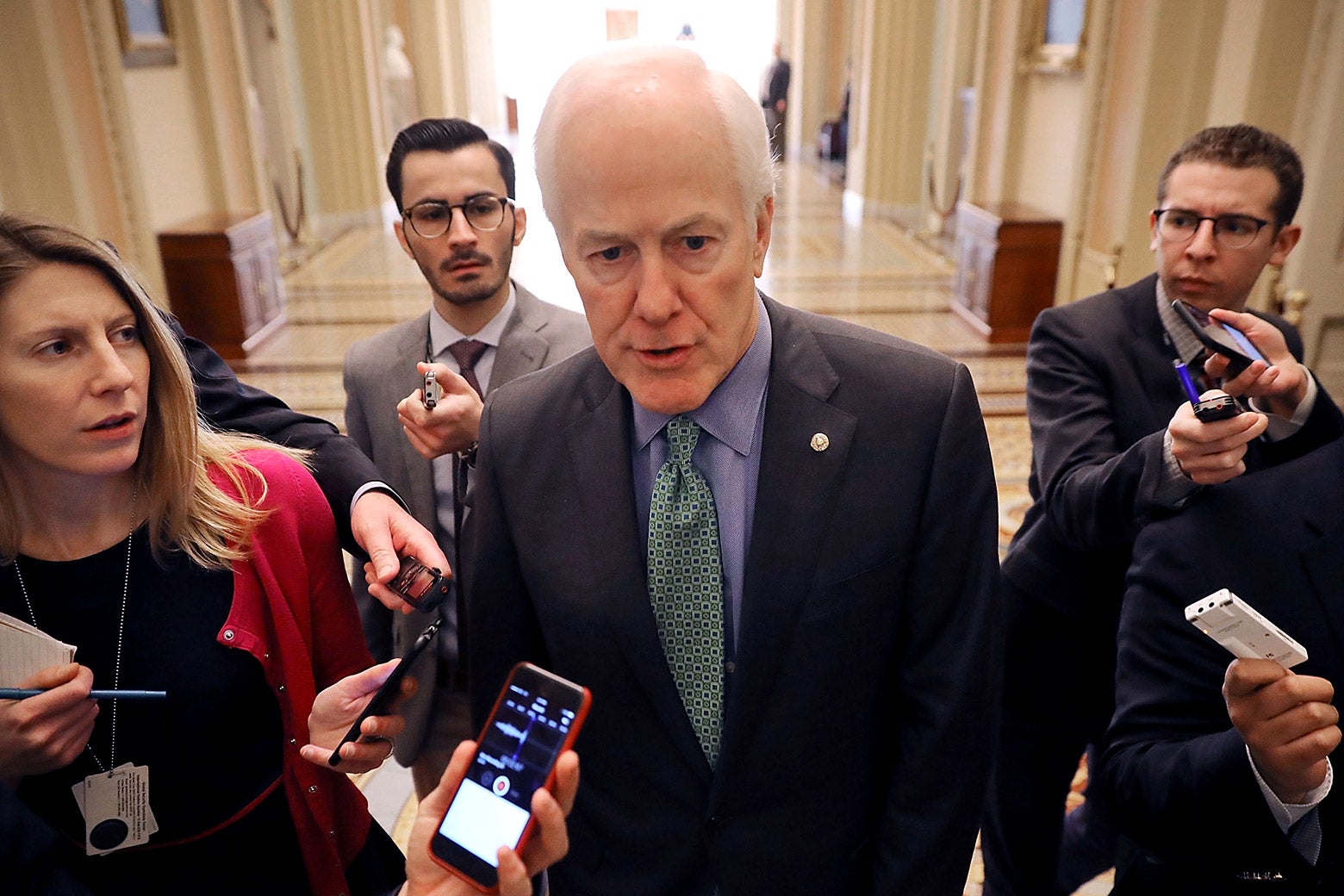The country is now living that familiar moment following a mass shooting in which it appears that Congress could—and has no reason not to—pass the absolute bare minimum gun legislation. Blink, and you might miss it.
After Sandy Hook, there was the Manchin–Toomey compromise bill that made it as far as a failed Senate vote. After the Las Vegas massacre, support for legislation banning the use of “bump stocks” approached a critical mass before the National Rifle Association gracefully sequestered it into an agency regulatory process. (President Trump announced his support for banning the devices on Tuesday.) After the Sutherland Springs shooting, in which the Air Force failed to report the shooter’s domestic violence court-martial into a federal database that would have prevented him from purchasing the rifle used in the shooting, a bipartisan group of senators introduced legislation to shore up the National Instant Criminal Background Check System (NICS).
After Parkland, the discussion is … still about that bipartisan legislation to shore up the National Instant Criminal Background Check System.
The Fix NICS Act, drafted by a group of eight senators led by Texas Sen. John Cornyn and Connecticut Sen. Chris Murphy, would reshuffle money to ensure that both federal and state authorities are fulfilling their NICS obligations. Both federal agencies and departments and states would have to draft implementation plans “focused on uploading all information to the background check system showing that a person is prohibited from purchasing or possessing firearms under current law,” per a release from when the bill was introduced in November. If a federal agency or department doesn’t comply with its implementation plan, its political appointees wouldn’t be eligible for bonus pay. States that comply with their implementation plans would be given preferential treatment for Justice Department grants. A stick and a carrot, respectively.
This legislation directly addresses the regulatory gap that led to the Sutherland Springs shooting, but it’s an odd response to Parkland. Though Nikolas Cruz, the Parkland shooter, had a history of unsettling comments that the FBI failed to act on, he had no convictions or court rulings that would trigger an official red flag under current law. Latching on to the Fix NICS Act as a response to Parkland is, in a way, a distraction from the thornier policy problems exposed by the Florida shooting, such as the narrow scope of background checks, even in a system with properly updated databases.
“It’s a good bill and we should pass it into law,” Sen. Murphy said in a statement, “but if this is all the White House is willing to do to address gun violence, it’s wholly insufficient.”
The Fix NICS Act was endorsed last fall by a broad mix of gun rights groups—including the NRA—as wells as anti–domestic violence groups. On Monday, White House press secretary Sarah Huckabee Sanders issued a statement that suggested the president could potentially support the legislation.
“The President spoke to Senator Cornyn on Friday about the bi-partisan bill he and Sen. Murphy introduced to improve Federal Compliance with Criminal Background check Legislation,” the statement read. “While discussions are ongoing and revisions are being considered, the President is supportive of efforts to improve the Federal background check system.”
Both gun safety groups and Senate Democrats working on the legislation are curious about what “revisions are being considered.” It is hard to see how this bill, which just uses money to ensure that information is in the database, could be watered down much further. Maybe the White House wants a few adjectives adjusted while leaving the bill mostly in place so that President Trump can claim credit. Or perhaps, the White House will demand substantive changes that repel Senate Democrats, and then Trump can blame Democrats for blocking common-sense legislation preventing criminals from obtaining firearms. The latter possibility rings a familiar bell in light of other recently collapsed legislative efforts.
There’s one particular reading of “revisions” that would take bad-faith legislative strategy to startling new depths. It would be to use the Parkland shooting, and the desire for more diligent background checks, to usher through separate legislation that further deregulates guns.
This was a strategy that House Speaker Paul Ryan tested last year. In December, House Republicans and a handful of Democrats passed NICS-fixing legislation that mirrored the Senate bill by attaching it to a concealed-carry reciprocity bill, the NRA’s No. 1 legislative priority. The bill was a nonstarter for most Senate Democrats. The “revisions” Trump has in mind, then, could be calling on the Senate to bundle the Fix NCIS Act with concealed-carry reciprocity—or just taking up that House bill.
John Feinblatt, head of the advocacy group Everytown for Gun Safety, told me Tuesday that he read “revisions” as “code” for doing just that. “It would be amazing, in the wake of Parkland, if Congress decides that the best response is to undermine state gun laws,” he said. In that case, Democrats would appropriately call it ridiculous, and Trump would blame them for the failure to keep kids safe.
Passing the Fix NICS Act shouldn’t be hard. No gun or gun accessory is being banned. No one who is allowed to purchase a gun under current law would be blocked from purchasing a gun. The law simply tries to ensure that reportable information should be reported into a database. It should have passed as a standalone bill by voice vote in both chambers on a single afternoon several months ago. But in Congress, when a piece of modest and near-universally accepted legislation on a hot topic is put forward, it’s never just passed. It becomes a bargaining chip.
